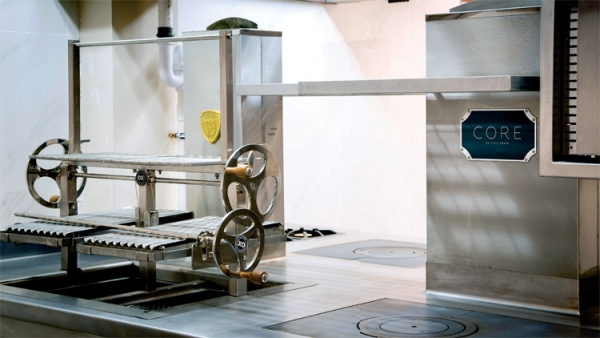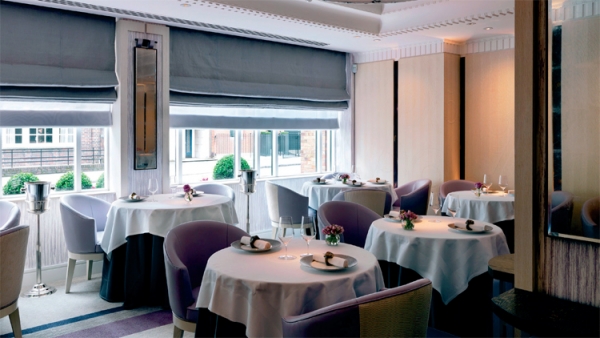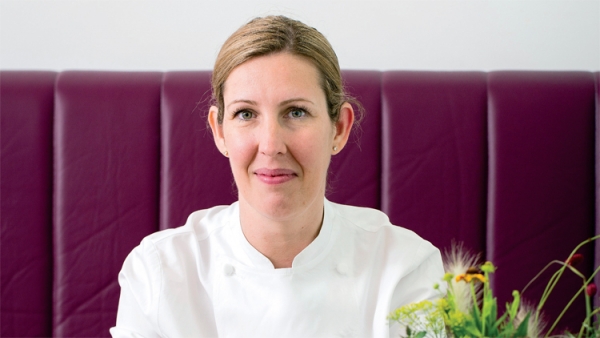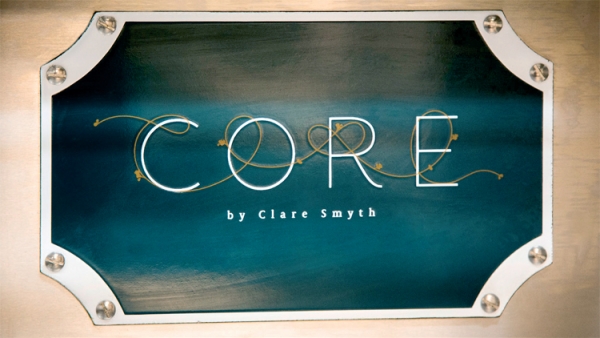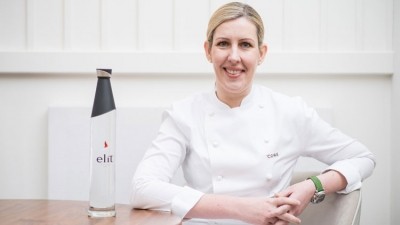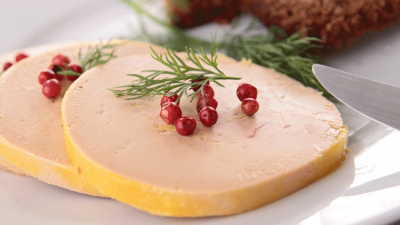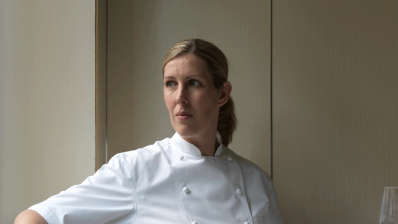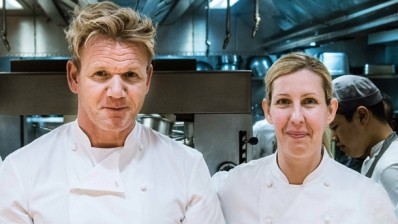Clare Smyth: How the UK's top chef is out to make fine dining cool again
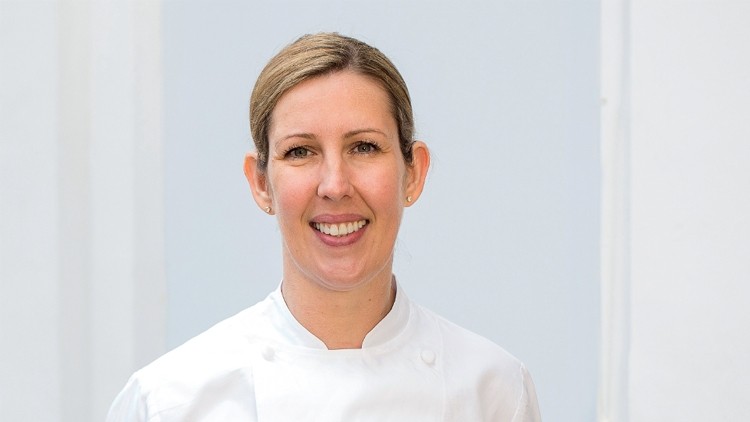
This interview was published in the August issue of Restaurant magazine ahead of the opening of Core on 1 August.
It’s 11 days until Clare Smyth opens her much-anticipated restaurant in Notting Hill and the rattle and thud of drills and hammers fills the air. The dining room floor isn’t finished and the walls and windows need repainting because the colour’s not quite right, but most significantly the kitchen isn’t in use. It’s all there behind huge glass windows – the glass door being fitted as we speak – but the pristine wood-burning grill is yet to be fired up.
Delays in restaurant builds are not uncommon – opening on time is a rarity these days – and Core is no exception. Due to open in July, inevitable problems with the build meant the grand unveil had to be pushed back to August, but there’s no more wriggle room. The date has been set, online reservations have been taken, the press release has been sent out. On 1 August, Core becomes a reality.
Having only a few days to prepare properly and do the full service run-through in situ isn’t the ideal scenario for any new restaurant, but for Smyth it’s especially tough. The expectation that surrounds her long awaited debut restaurant is almost tangible and Smyth – who famously held three Michelin stars at Restaurant Gordon Ramsay for nearly a decade and won it a perfect 10/10 score in The Good Food Guide – is aware that her cooking is going to be dissected from the get-go by London’s uncompromising critics and gourmands.
“My worry is that we’re still sitting in a building site and the expectation that people have means I need to be ready to go now,” she says over the continual clack-clack of a nail gun. “People who have worked at that level know what it’s like. It takes time to get to that level, to train staff and to understand how the building is going to work and how the food will work. Certainly more than a couple of weeks.”
Time isn’t a luxury Smyth can afford, or that the critics will likely give her. “I’ve grown a pretty thick skin through all the years at Gordon Ramsay Group and reading some of the things people would write,” she says at the prospect of having people expect three-star food from the moment Core opens. “I’ve grown up working under one of the most scrutinised chefs on the planet, but I’ve also learnt to read between the lines and to be honest to yourself.”
Making things modern
With her new project, Smyth is certainly being true to herself. Located in the building that once housed Leith’s, the Michelin-starred restaurant that kickstarted Pru Leith’s career as a restaurateur (it was more recently home to Notting Hill Brasserie), Core continues in the tradition of fine dining that Smyth has practised for practically all of her career.
“Core came naturally, it’s how I want to cook and like to eat,” she says. “I’m very passionate about fine dining, it’s all I’ve ever done.”
That said, Smyth is aware that in a restaurant scene embracing small plates and a more casual approach to dining – her fellow Ramsay protégé’s have all gone on to open at least some restaurants in that mould – fine dining is hopelessly uncool. But with Core, she hopes to change all that.
“Fine dining is a horrible term but there’s no other way to describe it in English. It’s haute cuisine. It’s not trendy any more. But that’s what me and my team do and it’s what we’ve always done. We aim for perfection every day and we should be proud of that. I would really love to see people be enthusiastic about fine dining again, and celebrate it for what it is.”
Her first solo restaurant is Smyth’s attempt to offer evolved fine dining and to bring the style of cuisine firmly up to date. This has meant addressing all the things that many people don’t like about it. “It’s intimidating, it’s expensive, and waiters can often be a bit stiff. People often worry whether they are dressed properly or are scared to order some dishes because they don’t know how to pronounce them. But eating out is about people having fun. It’s about making them feel at home.”
Core won’t have tablecloths, the leitmotif of fine dining, but for practical and environmental reasons rather than in the name of casualisation that is often cited as the reason behind their removal. “It’s not great for the environment laundering it and it’s expensive,” says Smyth. “We need to be economically as well as environmentally sustainable.”
The choice of music in certain parts of the restaurant also doesn’t fit with traditional fine dining establishments, with guests just as likely to be greeted with the sounds of The Rolling Stones as classical music as they walk in the door. And there is no dress code.
“We’re not just doing stuff because that’s what you do in these type of restaurants, we are really questioning it and removing the things people don’t feel comfortable with. Where do you put the cutlery on the table? Do we need tablecloths or a dress code? What music do we play? We can do anything; the truth is, there are no rules.”
But make no mistake, Core is very much a fine dining restaurant, and unashamedly so. “We want to give the phenomenal food and service that is absolutely fine dining – we are proud of it and 100% behind it. Our waiters will be in suits. We will be serving food on bone china and using silverware. But we want to make it modern. My team has trained their whole lives in fine dining and we are the people who can push it forward and make it cool again. We are really thinking about what’s happening in fine dining and what the guest wants now.”
This means that handbag stools – another symbol of the elite dining room – will feature, despite their somewhat unfashionable reputation in today’s restaurant scene. But rather than fork out hundreds of pounds for the kind of ornate specimens that might be found in restaurants such as Le Meurice in Paris, she’s opted for plain and simple wooden ones hand-made for the restaurant at £40 each.
“If people have an expensive Mulberry handbag, why should they have to put it on the floor? It’s not about being fancy or over the top but looking after people. There are still a lot of people who go out for a meal for the comfort and service that comes with it.”
A life of fine dining
Core’s unabashed approach to fine dining should come as no surprise. As well as being the the first British woman to hold three Michelin stars, Smyth has won scores of accolades from the UK-based restaurant guides for her cooking and fastidious attention to detail.
Born and brought up in County Antrim in Northern Ireland, her CV includes time spent in the kitchens at Bibendum, The Fat Duck and The Waterside Inn, as well as in Australia. On returning to England, she moved to the St Enodoc Hotel in Cornwall before landing a job at Royal Hospital Road in Chelsea, now called Restaurant Gordon Ramsay, in 2002.
Under Ramsay, she rose rapidly through the ranks, working her way up to senior sous chef in just three years. She left the restaurant in 2005 to do stages at US chef Thomas Keller’s restaurants the French Laundry in California and Per Se in New York before moving to France to work at Alain Ducasse’s Le Louis XV in Monte Carlo.
Smyth returned to Restaurant Gordon Ramsay in 2007 where she was quickly named head chef aged just 28. Then, in 2013, following a refurb at the restaurant she went into partnership with Ramsay, becoming chef-patron of the business.
Ramsay’s influence has been significant and Smyth (unlike some of the notoriously fiery chef’s other proteges) not only talks fondly of her time working with him but the pair have remained friends. Ramsay was the first person to come with her to look at the Notting Hill site and was also the first person she asked to taste her menu.
“I’m very lucky to have someone who has that amount of experience to buffer things off,” she says. Will he like it? “I think he’s going to love it,” is the response.
Ramsay has been an ardent supporter of Smyth and has helped with her transition away from Gordon Ramsay Group. Although Smyth announced that she would be leaving the group 18 months ago, she has kept her hand in the business and to incredible effect – she spent time at its Bordeaux restaurant, during which time it won its second Michelin star, and has also helped at the restaurant in Versailles as well as Restaurant Gordon Ramsay and Petrus.
Despite their past close business relationship, however, Ramsay isn’t a backer of Core. “He is fully a supporter but didn’t want to have a financial stake,” she says.
Was it hard saying goodbye to the restaurant she has spent so much time in? Does she finally feel liberated that she is fully stepping out of Ramsay’s shadow? “It’s not a feeling of liberation. Opening my own place was always in the back of my mind but Gordon gave me so much at Royal Hospital Road (Smyth refers to the restaurant’s old name throughout) – a partnership, a share in the business. He kept me there and pushing forward and achieving the things we wanted to achieve there. I never felt limited. Gordon let me do whatever I wanted. He never stood in my way and gave me the confidence to get on with things. He always had my back.
“You have to be so single-minded and focused to run a three-star restaurant. It takes a phenomenal amount of dedication every single day. There’s not a lot of glory in it. It was time to do something new, but saying goodbye isn’t a thing. It’s still a big part of my heart.”
Personality at its core
Smyth is relishing the ability to show a different side of herself with Core. The restaurant will be as beautiful as her last but in a different way, she asserts, with more of her personality allowed to shine through.
Unlike at Restaurant Gordon Ramsay, for example, Smyth says she is under no obligation to use expensive and luxury ingredients (although she isn’t going to completely turn her back on them).
“When you’re at the longest holding three-star restaurant in London, you have to serve luxury products. People are paying for foie gras, truffles and caviar, and it’s a dream for a chef to be able to cook with all those ingredients. But I’ve done that and now I’m doing something else.”
So, a potato dish that Smyth might have served with caviar in the past comes instead with trout or herring roe and Core will also celebrate its Britishness with riffs on dishes such as jellied eels. Its approach to food will also be more sustainable and reflect the movement towards less wastage and people cutting down on their meat and fish intake, making vegetables the hero ingredient.
The menu will feature a lamb-braised carrot dish, for example, in honour of the carrot Smyth would pinch from the pot when cooking braised lamb. A scallop dish, cooked in the shell on the kitchen’s impressive wood burning grill, makes use of all the bivalve with the roe poached and served as a garnish and the skirt used for stock. The restaurant even has its own beer brewed for it and the malted grain used in the drink’s production will be ground down for the bread.
Core will serve 12 dishes, give or take (“I’ll add things, I love to do things on a whim”), as a full tasting menu but will also give diners the option of a five-course meal or to choose three dishes a la carte. This flexible approach also means the whole table doesn’t need to order the tasting menu, should only one person opt for it.
“Not everyone wants to eat a large tasting menu, particularly in London. People don’t have the time. Connoisseurs who know more about food than I do are eating all over the world all the time and they can’t eat tasting menus.”
Smyth describes the price point as “humble” given Core’s post code and ambition, with 12 courses priced at £95, five at £80 and three at £65, although these could rise in time. “We just want to get people in and get it right first. But in the UK we never charge enough in restaurants compared to those in Europe.”
In addition, Smyth will have a bar at her disposal for the first time, at the entrance to the restaurant, at which 18 people can sit. As well as being the place for a pre or post-meal drink, diners who haven’t made a reservation can eat at the bar, anything from the full 12 courses to just one particular dish, including the petits fours. Bar staff have also created cocktails that pair with the food.
Core’s wine list will be serious, with some big-hitting bottles on the list – some of which have come from Smyth’s own personal collection. It will have around 480 bins and a large selection of fine wine with price tags to match, although there will be around 30 wines at under £60 a bottle. The restaurant will also have four sommeliers, if anyone was in any doubt as to how seriously it is taking the wine side of things.
Sowing a new seed
What is liberating for Smyth, she says, is being able to take a high-end approach but not feel the pressure she might have done in the past. “In my career I’ve achieved a lot of things that were important me. I always had my sights set on running a three Michelin-starred restaurant. I got 10 out of 10 in The Good Food Guide, five out of five AA rosettes, an MBE. It is liberating that I don’t feel I have to prove anything to myself any more. I can cook in a way that I want to. If the accolades come then great, but this has got to work as a business.”
She believes Core – so named because it is what Smyth holds in her heart and also because it is the seed of something new – will continue the very important lineage of fine dining. “It is what influences the rest of the industry. The creative people push the boundaries and set the benchmarks and trends.”
Furthermore, she says it will help ensure the industry retains the vital skills that are its life blood. “This type of cooking is really important for training and discipline. There’s a massive skills shortage and we need to be training youngsters through structured kitchens. Young cooks say to me that they are not interested in cooking at The Waterside Inn and I say, ‘What, you’re not interested in learning how to cook properly?’. It’s really important that we educate young cooks to understand the importance of places like The Waterside Inn and to learn from them.”
And she’s not a lone voice, she insists. “We’re not a dying breed, and neither is fine dining. It’s up to people like me to make sure it isn’t. Everyone here is in their 30s, we’ve all got enough experience behind us to know what we’re doing but we’re still young enough to push it into the future. There’s places in the world that do modern fine dining really well and it is our responsibility to make it relevant over here. We have to own it.”
